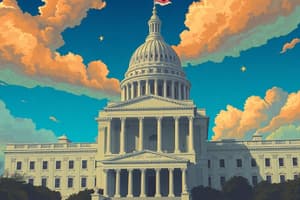Podcast
Questions and Answers
What is the Legislative Branch?
What is the Legislative Branch?
Legislative Branch
What entities are included under the Legislative Branch?
What entities are included under the Legislative Branch?
Congress, House of Representatives, Senate
What is the Executive Branch?
What is the Executive Branch?
Executive Branch
What entities are included under the Executive Branch?
What entities are included under the Executive Branch?
The President can veto congressional legislation.
The President can veto congressional legislation.
Congress can approve presidential nominations and control the budget.
Congress can approve presidential nominations and control the budget.
The court can declare Presidential acts unconstitutional.
The court can declare Presidential acts unconstitutional.
The President nominates judges and enforces judicial opinions.
The President nominates judges and enforces judicial opinions.
What is the Judicial Branch?
What is the Judicial Branch?
What entities are included under the Judicial Branch?
What entities are included under the Judicial Branch?
The court can declare laws unconstitutional.
The court can declare laws unconstitutional.
The Senate confirms presidential nominations and Congress can impeach judges.
The Senate confirms presidential nominations and Congress can impeach judges.
Flashcards are hidden until you start studying
Study Notes
Legislative Branch
- Responsible for making laws and consists of Congress, which is divided into the House of Representatives (HOR) and the Senate.
- Members of both chambers can veto bills proposed by each other, ensuring collaboration and checks within the legislative process.
Executive Branch
- Comprised of the President, the Executive Office of the President, various executive and cabinet departments, and independent government agencies.
- Plays a crucial role in implementing and enforcing the laws passed by Congress.
Checks from Executive to Legislative
- The President has the power to veto legislation approved by Congress, providing a check on legislative authority.
Checks from Legislative to Executive
- Congress can approve or reject presidential nominations for key positions, maintaining a balance in the appointment process.
- Controls federal budget, influencing executive actions and policy implementation.
Judicial Branch
- Includes various levels of courts, such as the Supreme Court, Courts of Appeals, and District Courts, responsible for interpreting laws and the Constitution.
Checks from Judicial to Executive
- Courts have the authority to declare Presidential actions unconstitutional, providing a check on executive power.
Checks from Executive to Judicial
- The President nominates judges to the judicial branch, influencing its composition and decisions.
- Responsible for enforcing judicial rulings, ensuring that court decisions are implemented.
Checks from Judicial to Legislative
- Courts can declare laws passed by Congress unconstitutional, maintaining the supremacy of the Constitution.
Checks from Legislative to Judicial
- The Senate confirms judges nominated by the President, ensuring legislative oversight of the judiciary.
- Congress possesses the power to impeach and remove judges from office, acting as a check on judicial independence.
Studying That Suits You
Use AI to generate personalized quizzes and flashcards to suit your learning preferences.




